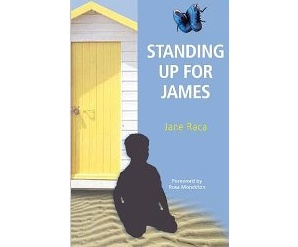Vulnerable Groups - prevention and early years intervention
If you have come to
help me
You are wasting your time
But if you have come
because your
liberation is bound
up with mine
Then let us work
together
Lila Watson, Aboriginal Australian, Goldfields 1989

Special Educational Need and Disability- SEND
EHCAP is working closely with the Department for Education and with the National Sensory Impairment Partnership keeping up to date with changes to the Statements for Educational Need and the development of Multiagency or Education, Health, Care (EHC) Plans.
Read about Jane Raca's experience as James' Mum or visit her website and find out more about her work campaigning for the rights of disabled children.
Safeguarding, Children in Need and Looked After Children
Shoba Manro Holly- co founder of EHCAP is an experienced social worker with expertise in child protection and safe guarding and is our named Safeguarding Lead.
Shoba has recently completed the Signs of Safety 5 day residential training with Andrew Turnel and Viv Hogg. She is presently using the concepts as an Independent Reviewing Officer and Child Protection Chair. Next year Shoba will go to Australia to further develop her skills in using Signs of Safety. The Signs of Safety programme was originally devised in Western Australia and is now being rolled out in the UK. Interest in the Signs of Safety is growing exponentially in Europe, North America and Australasia, with full-scale implementations of the model currently underway in over 100 jurisdictions in 12 different countries including 20 implementations within the UK. The Signs of Safety method continues to create enormous energy and interest because it is focused on what actually works for front-line practitioners. The Signs of Safety Gatherings provide the opportunity for participants to hear the leading exponents of the approach describe what Signs of Safety looks like at its best.
Join Shoba and Sarah at the next UK gathering in Apil 2014 where Professor Eileen Munro (who led the Munro Review into English Child Protection system) will draw the gathering to a close. Or follow Shoba on Twitter as she embarks on a year working with the Signs of Safety team in Western Australia.
The child protection system in England is in crisis ... the current hierarchical system often results in blame being apportioned to individuals rthare than a systemic overview of systems. Professionals need empowerment with skills in order to provide relationship centered care in a very challenging job. Signs of Safety is a tool or output that can enable us all by providing these skills.
Link to Working Together Guidance April 2013
Link to Ofsted Annual Social Care Report
Progress Report May 2012 Professor Eileen Munro
Shoba and Sarah both believe that Signs of Safety is the way forward for child protection work and for improving outcomes for vulnerable children and young people in the UK. They are both struck by how it is a 'way of being' for a practitioner.
In other words Signs Of Safety tackles the cultural shift necessary for us all to practice relationship centered care. There are many models that come and go - Signs of Safety is about showing respect and dignity to families going through very truamatic times and working in partnership with them.
In addition Sarah is training in using restorative justice as a process enabling a solution focus when staff and families become locked in dispute.
Investing in children
Investing in Children, produced by the Social Research Unit at Dartington, provides free and independent advice on the costs and benefits of competing investment options in children's services
In 1996, the Center for the Study and Prevention of Violence (CSPV), at the Institute of Behavioral Science, University of Colorado Boulder, designed and launched a national youth prevention initiative to identify and replicate violence, delinquency and drug prevention programs that have been demonstrated as effective. The project, initially called Blueprints for Violence Prevention, identifies prevention and intervention programs that meet a strict scientific standard of program effectiveness.
The identification of Blueprints model and promising programs is based upon an initial review by CSPV of a program's evaluation evidence and a final review and recommendation from a distinguished Advisory Board, comprised of six experts in the field of positive youth development.
Today, Blueprints is funded by the Annie E. Casey Foundation. With this funding, outcomes have been expanded to include not only problem behavior, but also education, emotional well-being, physical health, and positive relationships. Blueprints has also been rebranded as Blueprints for Healthy Youth Development. More than 1,100 programs have been reviewed, but only a small portion of them have been designated as model or promising programs based on their ability to effectively improve developmental outcomes in the areas of behavior, education, emotional well-being, health and positive relationships. Blueprints continues to look for programs which meet the selection criteria.
Family and Community Focus
We believe that taking a family/community approach, early intervention and working together are key to improving outcomes for babies, children and young people :
- with additional needs and /or disability
- poor school attender or excluded from school
- antisocial behaviour/ contact with criminal justice system
- at risk of being NEET (not in education, employment or training)
- with drug and alcohol issues
- with mental health issues
- exposed to domestic abuse
- with a parent or carer in contact with the criminal justice system or ex prisoner/ on probation
- with a very young parent
- with a parent who was a Looked After Child
- on a child protection plan or being assessed for one
- child in need
- with a parent or carer with either mental or physical ill health
- with a parent or carer who is an addict
- with no adult in the immediate caring role who is in employment or multi generational unemployment
- homeless
- Our mission is to improve the lives of vulnerable people by changing the practice of those who work with them. We do this by sharing transformative knowledge, encouraging deep reflective practice, and empowering individuals and organisations to make a difference.
- We understand that all human beings are both vulnerable and resilient. We work to promote resilience in the individuals and networks supporting the most vulnerable people in our society, so that they in turn can promote the resilience of those with whom they work.
- We believe that the key relationships that enable change and promote resilience are those that are encountered on an everyday basis with knowledgeable and empowered individuals.
- We believe that every human being is unique, irreplaceable and infinitely valuable.
UK Health Justice and Learning Disability Network
see www.jan-net.co.uk for an electronic joining form .. a free resource sponsored by NAS & Calderstones NHS Trust
Self harm and suicide mitigation
STORM® began as a research project at the University of Manchester in the mid-1990s in response to the need for skills-based self-harm risk assessment and management training. The content of the programme is delivered through a skills based model of training underpinned by Adult Learning Theory.
In 2003 'The STORM Project', a research group and not for profit venture within the University, was created to disseminate the training to service providers. Over the last decade STORM has been disseminated widely to healthcare, social care, education and criminal justice services. There are currently over 500 trained Facilitators, delivering training in organizations and partnerships across the UK, Republic of Ireland, and Malta.
Criminal Justice System
EHCAP is responding to the Children’s Commissioner’s Report 2012 by developing a special interest in the well being of children, young people and mothers who are in contact with the criminal justice system. There is a high prevalence of disability including neurodevelopmental disorders such as ADHD and unmet emotional wellbeing and mental health needs for young people being held securely. Approximately 60% of children in the youth justice system have significant speech language and communication needs. Around 50% have a learning difficulty.
With reference to the Angiolini Report commissioned by the Scottish Government.
'the evidence is now overwhelming that intervening in the early years of life will have significantly more impact on rates of reoffending than intervening later in life. Parenting programmes and intensive family support have been shown to reduce conduct disorders in children, and reduce the likelihood that such children will experience future problems with offending behaviour. Prevention and early years intervention were not part of the Commission’s remit, but we strongly support prioritisation of evidence-based support for parents and young children. Early intervention must start with the mother. It will be more difficult to effect the behavioural change which is necessary to improve outcomes and to reduce reoffending once a woman is entrenched in the criminal justice system.'
There is plenty of evidence that coutcomes for children and young people improve with parent and family support. NICE guidelines jointly produced by the NHS and Social Care recommend that parents of children with a conduct disorder should be offered a parenting programe. CAMHS and Schools: early action project in Australia have joined with Tuning in to Kids in providing emotion coaching for parents as an early intervention for young children considered at risk of developing a conduct disorder.
Ruth Marriott has recently started working with reducing offending through The Realising Ambition Project -
The Realising Ambition programme seeks to achieve the following outcomes:
- More children and young people benefit from opportunities and support to fulfil their potential, avoiding pathways into offending.
- Build the evidence of what works in avoiding pathways into youth offending enabling young people to realise their potential
- Replicate the most effective approaches.
Women and Children experiencing Male Violence
We find the Freedom Programme http://freedomprogramme.co.uk/index.php effective and user friendly and will continue to develop relationships with their local teams
Useful Links
Full Stop Addiction based Harley Street and 56 London Road

